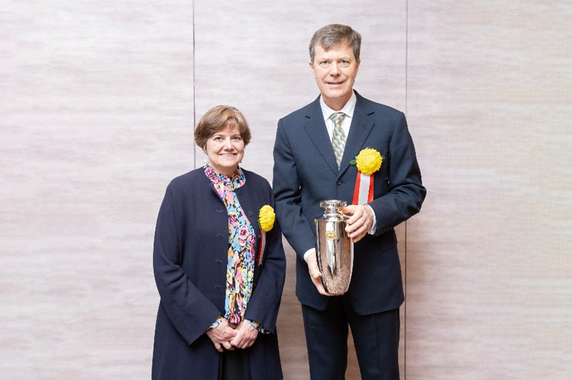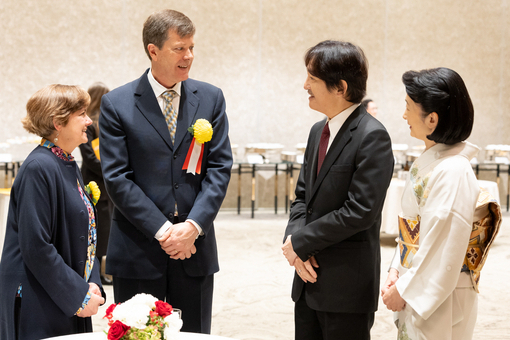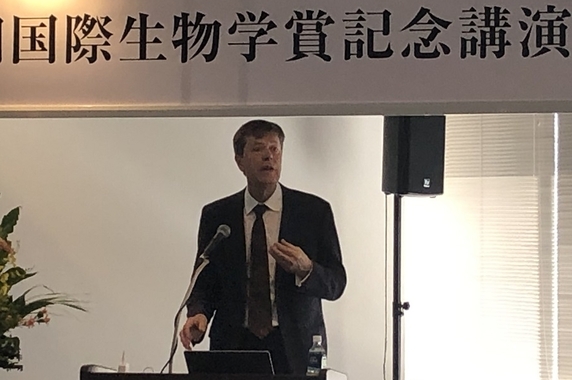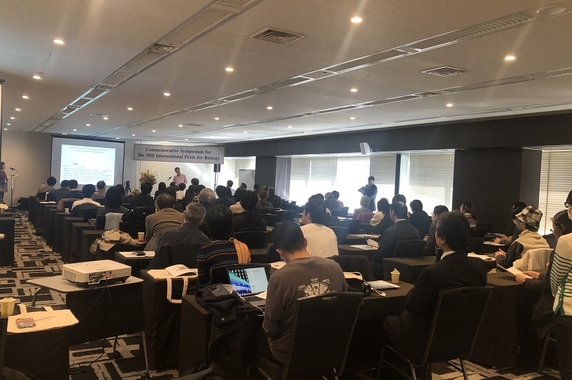International Prize for biology
Past Recipients/Presentation Ceremony2023 Presentation Ceremony, Acceptance Address, Selection Process
Presentation Ceremony
for the 2023 International Prize for Biology was held
in the presence of Their Imperial Highnesses the Crown Prince and Crown Princess on December 14
for the 2023 International Prize for Biology was held
in the presence of Their Imperial Highnesses the Crown Prince and Crown Princess on December 14
39th Prize Recipient
Dr. Richard Durbin, Al Kindi Professor, Department of Genetics, University of Cambridge, United Kingdom
Dr. Richard Durbin, Al Kindi Professor, Department of Genetics, University of Cambridge, United Kingdom

Presentation of the award
On December 14, the presentation ceremony for the 2023 International Prize for Biology was held at Meiji Kinenkan in the presence of Their Imperial Highnesses the Crown Prince and Crown Princess, Mr. MORIYA Hiroshi, Deputy Chief Cabinet Secretary, and Dr. MORIYAMA Masahito, Minister of Education, Culture, Sports, Science and Technology (MEXT).
At the ceremony, Dr. Durbin was presented the Prize of 10-million yen and a medal by Dr. FUJIYOSHI Yoshinori, Chair of the International Prize for Biology Committee, along with an Imperial gift from the Crown Prince.
Following an address offered by the Crown Prince, congratulatory messages were delivered by Prime Minister KISHIDA Fumio (read by Mr. Moriya) and MEXT Minister Moriyama. The ceremony concluded with an acceptance address from Dr. Durbin.
After the ceremony, a gathering to honor the Prize recipient was held in the presence of the Crown Prince and Princess.
At the ceremony, Dr. Durbin was presented the Prize of 10-million yen and a medal by Dr. FUJIYOSHI Yoshinori, Chair of the International Prize for Biology Committee, along with an Imperial gift from the Crown Prince.
Following an address offered by the Crown Prince, congratulatory messages were delivered by Prime Minister KISHIDA Fumio (read by Mr. Moriya) and MEXT Minister Moriyama. The ceremony concluded with an acceptance address from Dr. Durbin.
After the ceremony, a gathering to honor the Prize recipient was held in the presence of the Crown Prince and Princess.

Dr. Durbin holding his imperial gift

After-ceremony gathering with Crown Prince and Princess
I am deeply humbled, and indeed in no little awe at being here today to accept the honour of the 39th International Prize for Biology. I join you in commemorating the scientific vision of the Imperial family of Japan, and in recognising their long-term commitment to the development of basic research in science. I also recognise and deeply appreciate the efforts and consideration of the members of the Committee for this Prize, as well as the work of the Japan Society for the Promotion of Science.
I am doubly grateful for this award. First, as a representative of my field of genome biology, I want to sincerely thank the Committee for their selection of our field for this year’s Prize.
We are living in a remarkable period of change in biological science: the era of genome sequencing. The ability to read into a computer the list of DNA “letters” in a genetic sequence is a transformative technology for biology. It is the interplay between the genetic information encoded in the genome, which is naturally “digital”, and the ever-increasing power of modern computing to act on this information, which creates the field of genomics.
A milestone of this era of genomics was the sequencing of the human genome. But that was just the start. We went on to study the genetic differences between the sequences of individuals, which reveal much about how genes function and evolve. Today we can sequence genomes a million times more cheaply than when we first sequenced the human genome over 20 years ago. Using this progress, the Earth Biogenome Project now aims to provide reference genomes for all species on earth, extending genome biology to all of life.
These advances have changed medical genetics, biomedical research and crop breeding, so some see genomics as an applied technology. But genetic information is fundamental to life and I have always myself been driven by a desire to further our understanding of how genomes work in building an organism, and of how they have evolved. I hope that the award of this prestigious Prize for the advancement of research in fundamental biology reinforces the appreciation of genome biology as basic science.
Second, I am humbled by being selected from amongst genome biologists. I have been fortunate that my career has spanned the entire genomic era so far, that I started with a training in mathematics and computing which have been so central to progress in this area, and that I have been in the right place, and with the right people, to be involved in multiple key steps in the field.
In particular I need to thank all the people I have worked with and learned from. I have continued to learn all my life – some of the great joys for me in being a scientist come from learning about the discoveries and insights of my colleagues, and contributing to a global collective effort. I hope that my own work has repaid others in the same way.
When I started my PhD at the MRC Laboratory of Molecular Biology I met John Sulston, who I helped when he was mapping the genome of the worm C. elegans, and who invited me back in 1990 to start the Sanger Centre, now the Wellcome Sanger Institute. John died of cancer, too early, a few years ago, and I want to remember him here as my mentor.
With John and others in the international genomics community we strove to make genome biology a truly collaborative endeavour, openly releasing all the data, and developing software and databases to enable all scientists to benefit. More recently I moved to the University of Cambridge, to pursue more directly the connections between genomic and evolutionary biology. Through all these steps I have worked with many colleagues and students and made many friends. This Prize is awarded to me, but it should be shared by them all.
Thank you very much. Domo arigato gozaimasu.
I am doubly grateful for this award. First, as a representative of my field of genome biology, I want to sincerely thank the Committee for their selection of our field for this year’s Prize.
We are living in a remarkable period of change in biological science: the era of genome sequencing. The ability to read into a computer the list of DNA “letters” in a genetic sequence is a transformative technology for biology. It is the interplay between the genetic information encoded in the genome, which is naturally “digital”, and the ever-increasing power of modern computing to act on this information, which creates the field of genomics.
A milestone of this era of genomics was the sequencing of the human genome. But that was just the start. We went on to study the genetic differences between the sequences of individuals, which reveal much about how genes function and evolve. Today we can sequence genomes a million times more cheaply than when we first sequenced the human genome over 20 years ago. Using this progress, the Earth Biogenome Project now aims to provide reference genomes for all species on earth, extending genome biology to all of life.
These advances have changed medical genetics, biomedical research and crop breeding, so some see genomics as an applied technology. But genetic information is fundamental to life and I have always myself been driven by a desire to further our understanding of how genomes work in building an organism, and of how they have evolved. I hope that the award of this prestigious Prize for the advancement of research in fundamental biology reinforces the appreciation of genome biology as basic science.
Second, I am humbled by being selected from amongst genome biologists. I have been fortunate that my career has spanned the entire genomic era so far, that I started with a training in mathematics and computing which have been so central to progress in this area, and that I have been in the right place, and with the right people, to be involved in multiple key steps in the field.
In particular I need to thank all the people I have worked with and learned from. I have continued to learn all my life – some of the great joys for me in being a scientist come from learning about the discoveries and insights of my colleagues, and contributing to a global collective effort. I hope that my own work has repaid others in the same way.
When I started my PhD at the MRC Laboratory of Molecular Biology I met John Sulston, who I helped when he was mapping the genome of the worm C. elegans, and who invited me back in 1990 to start the Sanger Centre, now the Wellcome Sanger Institute. John died of cancer, too early, a few years ago, and I want to remember him here as my mentor.
With John and others in the international genomics community we strove to make genome biology a truly collaborative endeavour, openly releasing all the data, and developing software and databases to enable all scientists to benefit. More recently I moved to the University of Cambridge, to pursue more directly the connections between genomic and evolutionary biology. Through all these steps I have worked with many colleagues and students and made many friends. This Prize is awarded to me, but it should be shared by them all.
Thank you very much. Domo arigato gozaimasu.
On behalf of the Selection Committee for the 39th International Prize for Biology, it gives me great pleasure to report on this year’s selection process.
The Selection Committee consisted of twenty members, including myself and four overseas researchers.
The year’s field of specialization was the Biology of Genomes. To obtain recommendations of suitable candidates, the Committee distributed a total of 1,659 recommendation forms to Japanese and foreign universities, research centers, academic associations, international academic organizations, and others. A total of 50 recommendations were received in response. After excluding recommendations naming the same individuals, the number of persons recommended was 47, from 23 countries and regions.
While using online meetings, the Selection Committee met a total of four times. After carefully reviewing all the candidates, the Committee recommended Professor Richard Durbin to the Prize Committee as the recipient of the 39th International Prize for Biology.
After receiving his doctoral degree from MRC Laboratory of Molecular Biology, University of Cambridge, Professor Durbin continued his research at the King’s College and Stanford University. He is currently Al Kindi Professor at the University of Cambridge.
Professor Durbin has made invaluable contributions to the field of genome biology by leading data analysis initiatives that have formed the core of milestone genome projects. He has also developed many foundational and innovative technologies, such as data analysis methods, that have proven indispensable in deciphering a vast amount of biological information, and that have underpinned the advancement of biology as a data-driven science. In addition, Professor Durbin has provided strong leadership in international research projects that have aimed at comprehensively sequencing the genomes of a wide variety of organisms on earth.
The impact of his many achievements on the development of genome biology is profound. Professor Durbin’s work more than met all the selection criteria, which consisted of the relevance of the candidate’s research to the selected field of biology, its originality, its influence on the field of biology in question, and its contribution to the advancement of the biological sciences as a whole.
Based on our recommendation, the Committee on the International Prize for Biology deliberated and decided to award the 39th International Prize for Biology to Professor Richard Durbin.
This concludes my report on the process of the Prize selection.
The Selection Committee consisted of twenty members, including myself and four overseas researchers.
The year’s field of specialization was the Biology of Genomes. To obtain recommendations of suitable candidates, the Committee distributed a total of 1,659 recommendation forms to Japanese and foreign universities, research centers, academic associations, international academic organizations, and others. A total of 50 recommendations were received in response. After excluding recommendations naming the same individuals, the number of persons recommended was 47, from 23 countries and regions.
While using online meetings, the Selection Committee met a total of four times. After carefully reviewing all the candidates, the Committee recommended Professor Richard Durbin to the Prize Committee as the recipient of the 39th International Prize for Biology.
After receiving his doctoral degree from MRC Laboratory of Molecular Biology, University of Cambridge, Professor Durbin continued his research at the King’s College and Stanford University. He is currently Al Kindi Professor at the University of Cambridge.
Professor Durbin has made invaluable contributions to the field of genome biology by leading data analysis initiatives that have formed the core of milestone genome projects. He has also developed many foundational and innovative technologies, such as data analysis methods, that have proven indispensable in deciphering a vast amount of biological information, and that have underpinned the advancement of biology as a data-driven science. In addition, Professor Durbin has provided strong leadership in international research projects that have aimed at comprehensively sequencing the genomes of a wide variety of organisms on earth.
The impact of his many achievements on the development of genome biology is profound. Professor Durbin’s work more than met all the selection criteria, which consisted of the relevance of the candidate’s research to the selected field of biology, its originality, its influence on the field of biology in question, and its contribution to the advancement of the biological sciences as a whole.
Based on our recommendation, the Committee on the International Prize for Biology deliberated and decided to award the 39th International Prize for Biology to Professor Richard Durbin.
This concludes my report on the process of the Prize selection.
To mark the award to Dr. Durbin, a Commemorative Symposium for the 39th International Prize for Biology, “Biology of Genomes -Wonders of Living Creatures Revealed by Bioinformatics and Genome Research-”was held on December 16 and 17, 2023 in Yokohama, co-organized by the Graduate University for Advanced Studies, SOKENDAI and the Japan Society for the Promotion of Science.


